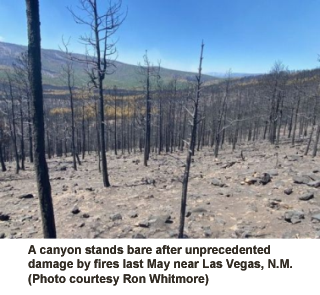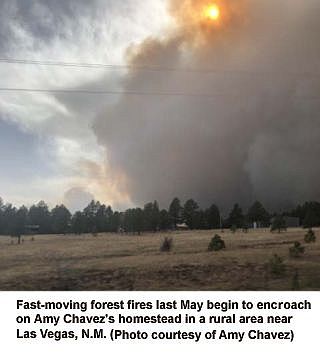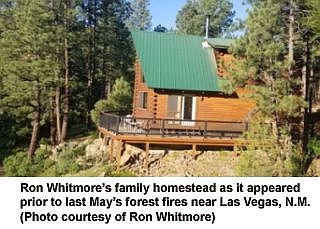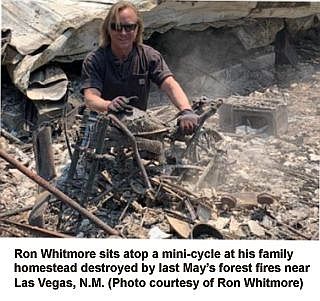
 |
by Sammie Ann Wicks Noticias Southwest Senior Correspondent | |
 | |
 | |
Last May, devastating forest fires near and centered in part on the towns of Las Vegas and Mora, N.M.burned thousands of square miles of pristine forestland, killed untold numbers of livestock and native flora, birds, and wildlife and destroyed more than 350 homes, displacing and separating families. This is their story, as filed by Noticias Southwest as it happened. | |
|
Amy Chavez starts telling her story, and cries. She recovers a moment, resumes her story, and cries again.
And who wouldn't? It would make a rock cry.
"It's been a total decimation," Chavez says, "of God's own country. Where we lived was a slice of heaven. What will it be now?"
Chavez and her husband, Conrad, who raised two sons at their Las Vegas home, in the early days of the fire watched it coming on fast toward them, but kept working to clear their property, hoping to stay put. They barely made it out.
"We were working, cleaning brush, and watching closely," Chavez says. "The fire, the embers, the dense smoke, were all around us.
"My husband, wanting to prepare me, said, 'Listen--we're going to lose the garage--the propane tank is right there, and the garage is going to burn.' It was painful for him to tell me.
"We just kept on working, working, working--but finally, my husband looked up, took a breath, and said, 'We've got to get out--now.'"

"I had driven this road a million times, so I trusted that," Chavez recalls. "But I suddenly stopped and said, 'Lord, please guide us out--we need your help.'" Then she got busy doing what she had to do. "I turned on to the road, and suddenly everything first when bright red, and then, wham! it went down total blackness," she continues. "Moving on, we found ourselves enveloped in this glowing, deep amber-colored fog, like a swirling cloud, all over and around us," she continues. "It was eerie." At full attention now, feeling her way over the ember-flecked roadway, Chavez continually checked her rear view mirror to make sure her husband, pulling the RV, was following close behind--riveted on her vehicle while watching the skies and what little he could see of the road. Then the worst came. "I lost him," says Chavez. "I looked back, again and again--and he was gone." Chavez somehow kept her wits, pushed on, and eventually came up on a firefighters' truck. "They just popped up, right there," Chavez says, "and when I told them where my husband probably was, they went right back in and led him out." Once to safely--the couple stayed for a few days in their RV near a small store in town at the invitation of the owner--Chavez, with very little rest, got to work. "When (Laguna Vista Quik Stop owner) Paul Gonzalez said he was taking food to people in the area who needed it, I joined in," she says. "I went out, scrounging for ingredients, materials, containers, anything I could find to feed people with, just working out of the truck, there was nowhere else," Chavez says. "I went out by the Lake (the area's Story Lake) to see if people needed anything, and took everything I could find, no matter how meagre--didn't matter--these weren't normal times." Her outreach paid off. "I got set up and everything put out. I made a big pot of beans, I made a pot of green chile, I made coffee, then I hustled up a few things to go with it all," Chavez says. And then there were no cups. "Everybody there got a cup and got fed, and we had just a little bit more food left," Chavez says. "But then I looked over and saw these sheriffs and some state police, and I noticed there weren't enough cups, and I thought, 'I need to feed these people! What am I going to do? There's not enough cups.'" Chavez says she motioned the officers over anyway, thinking she would at least feed all she could. But as luck, or providence, would have it, nobody went hungry. "So there's X amount of beans and chile, and X amount of cups," Chavez says, "and can you believe this? There was just the right amount of food, and exactly the right number of cups, and we fed all those officers." Remembering that unexpected turn, Chavez's voice gets quiet. "How did THAT happen?" she muses. Then she manages a little chuckle. "It reminded me of Jesus handing out the fishes!" After that, Chavez--an R N. by profession--took on the job of seeing if there were others she could help, anyone she could find--friends, neighbors, townspeople, even people she'd never met. She helped distribute food items and fresh fruit being offered by Gonzalez in Las Vegas, visited families and kids staying in shelters, and now is making plans for another project when the worst is finally over. "My husband and I want to host a kind of furniture depot, just go find things people can use when they're trying to get back into a house," Chavez says. "People are going to need things like that." Seeming no worse for the wear, Chavez says she has put much of her fear and sadness behind--in exchange for something a veteran firefighter told her when he saw her grieving over the fires' destruction.
"So then I thought about all of us today, everywhere, we've gone through such hard times, and I realized: "All that mattered yesterday--doesn't matter today. All the pettiness, all the daily complaints, all the worries, we don't have all we need, we ran out of milk, we lost our wallet--it doesn't matter today. "What matters today is what we grew up with--what we feel so deeply during this trial: We are the stewards of the land. The land, the people, the animals need us. "And we will rise through the ashes."
Driving swiftly away from his art supply store in Santa Fe, N.M. towards his family's decades-old homestead in the dense tracts of forest burning near Las Vegas, N.M., Ron Whitmore says at the time he thought he knew what to expect.
 "In those early moments we'd been watching the news constantly, so I knew it was going to be bad," he says. "But nothing in my life could have prepared me for what I saw when I got there." As he and his wife drove to Las Vegas to check on their home, Whitmore says he kept watching for changes along the highway and across the smoke-filled landscape, recalling that, with every passing mile, his heart sank. "Just as I made it to the local gas station right before the lake and scanned the horizon, I knew things were disastrous," he says. "I drove up to our property, stopped, looked out, and couldn't believe my eyes," he says. "It looked like the moon.
Whitmore says the damage to his home graphically revealed just how hot the flames burning his land got at their height. "Our home had literally melted--there's no other way to describe it," he remembers. "Even the glass windows melted out."
 The metal roof on his home, he adds, in the inferno began melting and softened, finally slumping down around what little was left at the bottom of the home's structure. But oddly, one thing stayed intact. "Our propane tank," he says. "It didn't explode, and it didn't melt. On our property that had been dense with lush, green trees and undergrowth, the only thing left was a metal tank. Go figure." In the middle of his loss, still fresh, Whitmore says when searching for answers, he thinks of his mother, now 93. "My mom was, is, such a powerful woman," he says. And it was she who first made this property happen." Whitmore explains that it was his parents who bought his homestead's original 1,000 acres and turned it into a nature preserve. "Don't get me wrong--they weren't rich at all," Whitmore says. "My mother in her youth was bequeathed a funky little old farm back East that got rezoned commercial and provided the wherewithal to buy this land, and to preserve it." But the question of wealth was originally significant, he says. "One of the reasons I respect my mother so much is she came from great wealth," Whitmore says, but she walked away from it all." Leaving her childhood home, Whitmore says his mother set out by herself in life without money, wanting to make her own way. "She was one of 10 kids. She just up and went out West one day, got a tiny apartment, and became a first grade teacher," he recounts. "She was the head of school boards, she organized school dances, she did everything. She's like a force." His mother's influence is what Whitmore says has helped him envision his next steps. "I think through all of this I've been kind of moving through the stages of grief," he admits. "You know, denial, anger, all of it. "And I had decided, 'It's just too much--I'm going to walk away.' But with a mother like mine, you can't just throw it all in." So with his sadness and stress slowly easing, Whitmore now says he thinks he has found his purpose. "I think we're all here--here on earth--to learn lessons," he says. "And I think this is mine. This will be a lesson in rebuilding. "I believe it's now my purpose to play a role in bringing back the land, the vegetation, the animals, help the trees come back. "I actually saw deer," he says. "They hadn't run away. We also have elk up here, bear, wild turkeys, all kinds of birds and animals. "I've been talking to the Forest Service, they'll be helping us," Whitmore says. "We need to reseed the native grasses to hold the soil, keep out non-value vegetation. It'll take some time, but--what's time, anyway?" Whitmore the artists' supplier is also a musician--a keyboardist and a song writer, with a voice as fresh and plain and honest as the man himself. "I write songs from the heart," he says. And that heart will surely touch the hearts of those around him as they struggle with their present circumstances, and wait, and watch the trees grow back.
"I know, I know, that I am at the bottom, at my lowest point in life--I know that now--we lost everything--there's nothing left." Michelle, the native northern New Mexican telling this story, is still moving through the loss of her family's home to the unprecedented destruction by fires in her area that have been burning since early April. (Michelle asked that we not reveal her last name.) "It's not just our own home, our trees, everything, that's gone--we lost the homes, all the belongings, of my mother, my husband's mother, who'd both just died," she says. "It's all gone--we couldn't get their things out." Her voice is quiet, restrained, touched by grief, as she labors to describe what she remembers of the day that changed her life. "In the beginning, all we knew was--it was around April 6--that a fire had started," Michelle begins. "We knew Hermit's Peak was on fire, we could see it--and then the smoke started coming towards us. "The next day, we hurried, we tried to pack up everything, we did our best," Michelle continues. "But we couldn't save anything--everything was destroyed by the fire." In the days to come, Michelle kept mentally working through what had happened, and, still overwhelmed, looked around her and saw she was not alone. "We met a man just outside of there, our neighbor, who told us, 'All I have now is what's on my back,'" Michelle remembers. "We found out that our home, and a lot of others', had been in a 'hot spot'--all our homes were taken." Michelle says that, at the time, she and neighbors were told containment efforts were being stymied due to high winds. "They weren't letting helicopters or airplanes fly, and the fire people couldn't work," she recounts. "The winds were extremely high--they told us nearly 78 m.p.h.--so conditions were life-threatening.
"Now, we sit and talk, try to figure out what to do, starting completely over, it just seems--unbelievable--our house was paid off, our land was paid off," she says. "My husband tells me the news, but I still can't handle it." Weeks into the disaster, in the midst of their loss, she and her family took tentative steps toward recovery that included nurturing life in the forest that miraculously had endured. "Finally, we went back out there, and we took stuff for the animals," she says. "A hummingbird was still there, alive, and came right up to us. We always loved and kept the hummingbirds, we would sometimes go through three gallons of hummingbird water a day! So while we were there, we put new feeders up. "We also put out birdseed, and took a bunch of food for the cats and dogs that were alive and still running around up there, you know, things like that." Michelle says she draws hope from two other near-tragedies her family had already survived. "I live through my kids," she says, "and both my daughter and my son at one time had very serious illnesses, and God brought both of them back, and they're still with me today. We all lived together in the house. And we're still together." "We're going to come back stronger than ever before"
"If it weren't for our friends, our neighbors, all our community people here constantly reaching out to us, it would be unbearable. "So if I need to, or one of my neighbors needs to communicate, even if it's three in morning, we do it, and everyone understands--nobody judges us." She announces the idea of a new house is now surfacing in her talks with her family. "My husband's a carpenter," Michelle says, "and we're talking about what it's going to be like. Hard to think about, but we'll see what comes." Michelle's voice quietly trails off, then brightens. "So what I want to tell people is--no matter who you are, what your religion is, or what you're going through, we all are children of God. No matter what our differences, God will lead us," she declares. The future, like the past, she says rests squarely on the shoulders of her people. "The Hispanic people are a stubborn people, a proud people," she declares with a quiet laugh. "And make no mistake--we are going to come back. "And when we do, we're going to come back stronger than we ever were before."
"I remember the moment my family was put on 'Set' status," says Jesus Romero, San Miguel County deputy manager, who like everyday citizens was impacted by the current forest fires around Las Vegas, N.M., looks after his own property while he helps run government operations. "That's our code way of saying what level of fire threat you're under," Romero explains. "It's ready, set, go." Romero says he and his family and neighbors continue to monitor the fires, and the fires' growing proximity to their properties, but admits it's a continual challenge for County employees whose homesteads are in danger to keeping working at their jobs. "We still have a county that needs to be run on top of stressing over our own places, so we just deal with it," he says. "Luckily, I have a supervisor (San Miguel County Manager Joy Ansley) who understands that everybody needs to take care of their own places," Romero says. Meanwhile, he says county employees continually report back on the ever-changing extent of damages to their community as the fire grows. "We're saying the fire is now about 26 percent contained, so it seems to be dwindling," he reports, "with about 300,000 square miles of land area gone, and around 350 homes destroyed. But some areas are better or worse off than others." The deputy manager says lands to the east are doing fairly well. "The eastern portion looks good," he reports, "but the south and north portions are continuing to grow. "Some people in various places have even been allowed to return," says Romero, "so there's progress there." For his part, the manager says his greatest inspiration has been having his friends and neighbors approach him to lend a hand with his own property. "There have been tons of people every single day, coming over and saying, 'What do you need, what can we help with?' and we do the same for them," he says. And like many of his neighbors and fellow area residents, Romero uses a single word to describe his people as they confront their difficult situation.
"I put it to the fact that most of us up here come from both Native American and Spanish roots. "From Spain, we get our guts and courage. I mean, it takes sheer guts to get on boat half a world away and go somewhere you know nothing about, and still find a way to survive--even thrive. "From our Native American roots we draw from this powerful resiliency, the unbelievable strength to somehow come though these ordeals even stronger than before--because we're tied to the land. "We're strong because our roots are embedded down in the grass, the soil--and we all feel it." |